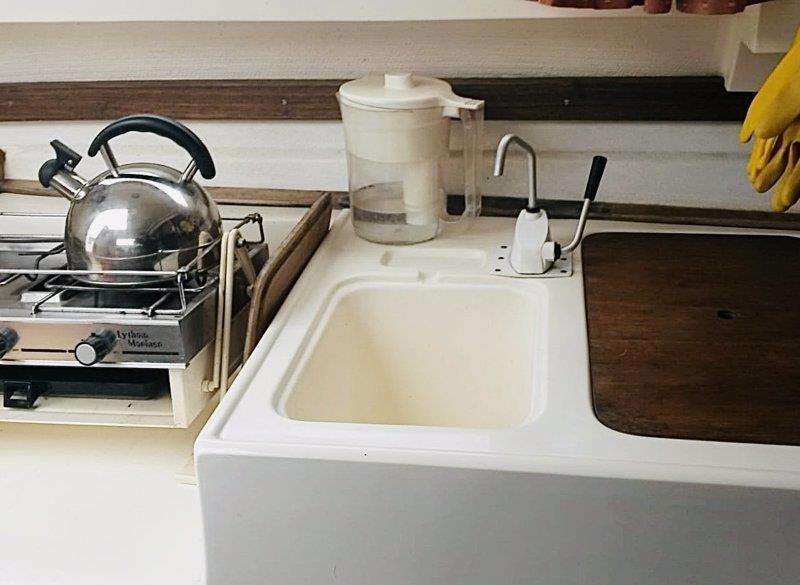
All drains lead to the sea - Clean Sailors on greywater
by Holly Manvell and Crew of Clean Sailors 24 Sep 2021 06:24 UTC

All drains lead to the sea - Clean Sailors on greywater © Clean Sailors
When we wash dishes, take a shower, brush our teeth and clean our boats, guess where our wastewater ends up? Yup, the sea. So, let's talk about 'greywater'.
Greywater = wastewater.
It's the term used for the dirty water discharged from our sinks, baths, showers and, on land, our washing machines.
When we are using soap to do laundry or washing dishes, when we are washing our hands or using personal care products in the shower, we are making greywater. We create greywater on land and at sea, but there is a difference in how quickly the dirty water gets into our waterways, once down our drains and sinks.
On land, we have complex multi-stage sewages systems to remove as many pollutants from the water as possible. Water treatment plants are only able to treat organic materials in our wastewater, but not chemicals. So, although our wastewater on land heads to water treatment facilities, many chemicals and hazardous materials cannot be removed and end up in our rivers, lakes, and importantly, our oceans.
For most sailors around the world, holding tanks aren't compulsory or formally encouraged and there are still limited pump-out facilities in marinas. What this means is for huge number of sailors and as boats have no sewage filtrating systems at all, everything we put down our boat drains goes into our oceans.
As you can imagine, greywater contains a lot of organic compounds plus phosphates, grease, oil and different chemicals from our washing, cleaning, scrubbing and boat maintenance duties. It is not clean water - you wouldn't want to drink it.
Similarly, when we clean our decks and hulls with detergents, all the chemicals we use in the water ends up in the sea, even if we put them down a drain. All drains lead to the sea. That's right. All drains on our boats lead to the sea. Greywater isn't clean water, as it contains anything we put down our drains.
On land, water treatment plants can't remove all the chemicals, and on our boats, the water doesn't get treated at all... Think about all the washing detergent, soap, shampoo, toothpaste, cleaning products, bleach, oil and grease heading down our drains each day - all are non-native to our watery environments and almost all contain man-made chemicals.
Clean Sailors on greywater
When toxic chemicals enter the water, a few things happen:
- Chemicals bind oxygen in the water, leading to less oxygen available for marine life and valuable species such as weeds and seagrasses.
- An excess of organic compounds in the water can lead to rapid growth of algae, which again leads to that the algae takes up all the oxygen from the other marine organisms leading to the death of marine life, or what we call 'atrophic' waters - basically waters with minimal oxygen content. Not good.
- Phosphate, an organic chemical, is commonly used in dish soap and detergents. Phosphates are not biodegradable and are soluble in water meaning they easily accumulate in the marine environment where they act as a nutrient for algae. When an excess of phosphates enter the marine environment they lead to an algal 'bloom' and process known as eutrophication. As the algae bloom die this, in turn, takes oxygen out of the water creating 'dead zones' where other aquatic fauna and flora literally suffocate.
- Phthalates are another type of chemical found in our fragrant cleaning products including all-purpose cleaning sprays and dish soaps. Phthalates are in fact endocrine disruptors, this means that they interfere with the actual hormones of many marine species, throwing off their ability to regulate their own chemical balances and to reproduce.
What can we do?
Let's think about what goes down our sink. This is the most important thing - on land and at sea, particularly at sea.
Most of our boats do not have holding tanks or access to pump-out facilities, so it's incredibly important that we pay attention to the products we are using, so we can best minimise the impact we have on our waters.
We can:
- Stay away from the bleach! Use plant-based, eco-friendly plastic-free products such as natural shampoo bars, washing up liquid, drain cleaner, shaving foam and other personal products. When our drain water heads into the sea, we need it to be as clean and chemical-free as possible!
- Use biodegradable and eco-friendly boat cleaners, without phosphates and other chemical nasties. (phosphates create algae blooms, starving the water and therefore other species of oxygen). The cleanest boat-cleaning option is freshwater, a great scrubbing brush and lots of elbow grease!
- Install a holding tank, to collect our wastewater for pump-out. This isn't required in many countries yet but if you have a pump-out near your marina or mooring, collecting your wastewater in a tank and disposing of it properly is the best possible way to keep our seas cleaner.
- Use shoreside facilities for showering, cleaning dishes and laundry, as far as possible. This way the wastewater will at least get filtrated through a multi-stage, land-based sewage system, which we don't have on our boats.
As sailors, we have a responsibility towards our seas, and if we all are conscious about our actions and make a couple of easy adjustments in our everyday sailing-life, we can have a great impact altogether.
Let's make sure everything that goes down our drains is as clean and low-tox as possible!
Quick Links:
This article has been provided by the courtesy of Ocean Cruising Club.